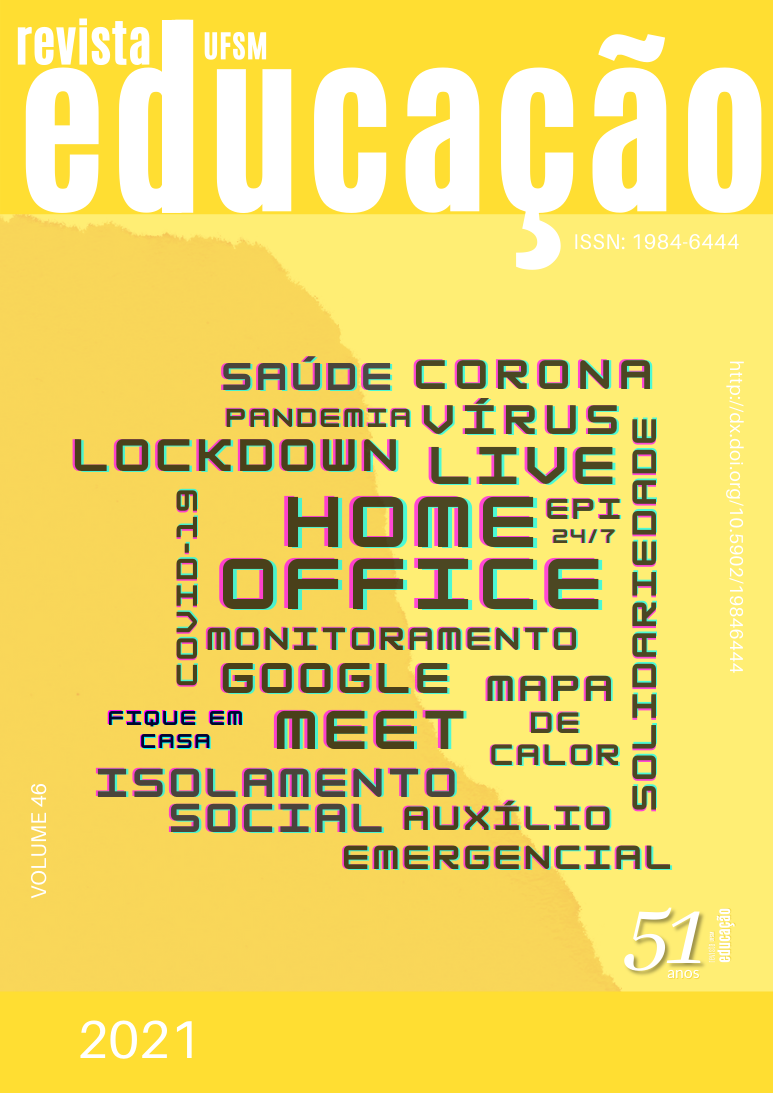Intercultural pedagogic practices: recognizing the differences in the classroom
DOI:
https://doi.org/10.5902/1984644440573Keywords:
Education, Identity, InterculturalityAbstract
The bibliographic revision purposed in this article talks to Candau (2008; 2011; 2012), Moreira (2008; 2012; 2013) and Walsh´s contributions (2009), developing a reflection about the basic school and the different cultures that live in its spaces. This piece of work starts by reflecting about the roles developed at school, followed by the cultural aspects that permeate these spaces and may vary between a monocultural education and/ or an intercultural one, pointing this last one as a different way to be thought educative theories and practices problematizing the urgency of valuing the cultural diversity present within the scholar spaces, recognizing and valuing the cultures brought by the subjects to the scholar space, stimulating dialogic communications among them. It has become necessary the equality and the differences to be valued, empowered and stimulated to communicate democratically with each other, awakening people’s interest, scholar process’ subjects towards to the comprehension that it´s not possible to solve the differences and let alone, to pattern equality as it happens in monocultural practices. So, the school has the challenging role to become teachers and students, agents to multiply more inclusive ideas and practices inside and outside school through curriculum. Based on this set, it gets to the conclusion that interculturality arises as a plausible way so that pedagogic contents not to pattern learning according to what was analyzed throughout the article which purposes that, through the dialogue of recognizing the different identities in levels of equality and difference, to be possible to constitute a democratic society from the scholar basis.
References
CANDAU, Vera Maria. Educação em direitos humanos e formação de professores/as. In: CANDAU, Vera Maria; SACAVINO, Suzana (Org.). Educação em Direitos Humanos – temas, questões e propostas. Petrópolis, RJ: DP et Alli Editora, 2008. p. 73-92.
CANDAU, Vera Maria. Multiculturalismo e educação: desafios para a prática pedagógica. In: MOREIRA, Antonio Flávio; CANDAU, Vera Maria (Org.). Multiculturalismo: diferenças culturais e práticas pedagógicas. 2ª ed. Petrópolis, RJ: Vozes, 2008, p. 13-37.
CANDAU, Vera Maria. Multiculturalismo, educação e direitos humanos. In: SACAVINO, Suzana.; CANDAU, Vera Maria. (Org.). Educação em direitos humanos: temas, questões e propostas. Petrópolis, RJ: DP et Alli Editora, 2008. p. 108-118.
CANDAU, Vera Maria. Diferenças culturais, cotidiano escolar e práticas pedagógicas. Currículo sem Fronteiras, v.11, n.2, p. 240-255, Jul./ Dez. 2011. Disponível em: http://www.curriculosemfronteiras.org/vol11iss2articles/candau.pdf Acesso em ago. 2017.
CANDAU, Vera Maria. Diferenças culturais, interculturalidade e educação em direitos humanos. Educação e Sociedade, Campinas, v. 33, n. 118, p. 235-250, jan./mar. 2012.
CANDAU, Vera Maria; LEITE, Mirian Soares. A didática na perspectiva multi/intercultural em ação: construindo uma proposta. Cadernos de Pesquisa, v. 37, n. 132, p. 731-758. Set./ Dez. 2007. Disponível em: http://www.scielo.br/pdf/cp/ v37n132/a1137132.pdf. Acesso em jun. 2017.
FORQUIN, Jean Claude. Escola e cultura: as bases sociais e epistemológicas do conhecimento escolar. Editora Artes Médicas, 1993. 201 p.
GABRIEL, Carmen Teresa. Conhecimento escolar, cultura e poder: desafios para o campo do currículo em “tempos pós”. In: MOREIRA, Antonio Flávio; CANDAU, Vera Maria (Org.). Multiculturalismo: diferenças culturais e práticas pedagógicas. 2ª ed. Petrópolis, RJ: Vozes, 2008, p. 212-245.
LOCKE, John. Ensaio acerca do entendimento humano. Os pensadores. 2. ed. São Paulo: Abril Cultural, 1978.
MOREIRA, Antonio Flávio. Identidade e Currículo. In: I SEMINÁRIO INTERNACIONAL DE EDUCAÇÃO, Porto Alegre: RS. Resumos... p. 1-16. 2008. Disponível em: http://www.educacao.rs.gov.br/dados/seminariointernacional/anto nio_moreira_identidade_curric.pdf Acesso em: 12 de jun. 2017.
MOREIRA, Antonio Flávio; CÂMARA, Michelle Januário. Reflexões sobre o currículo e identidade: implicações para a prática pedagógica. In:
MOREIRA, Antonio Flávio Moreira; CANDAU, Vera Maria. (Org.). Multiculturalismo: Diferenças culturais e práticas pedagógicas. 2ª ed. Petrópolis, RJ: Vozes. 2008. p. 38-66
MOREIRA, Antonio Flávio. Os princípios norteadores de políticas e decisões curriculares. Revista Brasileira de Política e Administração da Educação, v. 28, p. 180-194. jan./ abr. 2012. Disponível em: http://seer.ufrgs.br/index.php/rbpae/ article/view /36149/23337. Acesso em mar. 2017.
MOREIRA, Antonio Flávio. Currículo e gestão: propondo uma parceria. Revista Ensaio: Avaliação e Políticas Públicas em Educação, v. 21, n. 80, p. 547-562. Jul./ set. 2013. Disponível em: http://www.scielo.br/pdf/ensaio/v21n80/a09v21n80.pdf. Acesso em: abr. 2017.
SANTOS, Boaventura de Sousa. A gramática do tempo: para uma nova cultura política. São Paulo: Cortez, 2006.
SANTOS, Boaventura de Sousa. Pela mão de Alice: o social e o político na pós-modernidade. 14. Ed. São Paulo: Cortez, 2013.
SANTOS, Boaventura de Sousa. A difícil democracia: reinventar as esquerdas. 1ª ed. São Paulo: Boitempo, 2016.
WALSH, Catherine. Interculturalidade crítica e pedagogia decolonial: in-surgir, re-existir e re-viver. In: CANDAU, Vera Maria (Org.). Educação intercultural na América Latina: entre concepções, tensões e propostas. Rio de Janeiro: 7 letras, 2009. p. 12-42.
Published
How to Cite
Issue
Section
License
Declaration of originality
We declare that all articles present in the journal Educação (UFSM) are originals and were not submitted for publishing on any other publication, as a whole or a fraction. We also declare that, after being published by Educação (UFSM), a paper will not be submitted to another journal within two years. After this time, our journal transfers the publishing rights to the authors, with a permit granted by the Editorial Council.
We also acknowledge that the originals’ submission to Educação (UFSM) implies on a transference of copyright for physical and digital publishing to the journal. In case of noncompliance, the violator will receive sanctions and penalties predicted by the Brazilian Copyright Protection Law (n. 9610, dated 19/02/98).
Attribution 4.0 International (CC BY 4.0)
This license lets others remix, transform, and build upon the material for any purpose, even commercially, and copy and redistribute the material in any medium or format.

This work is licensed under a Creative Commons Attribution 4.0 International (CC BY 4.0)






